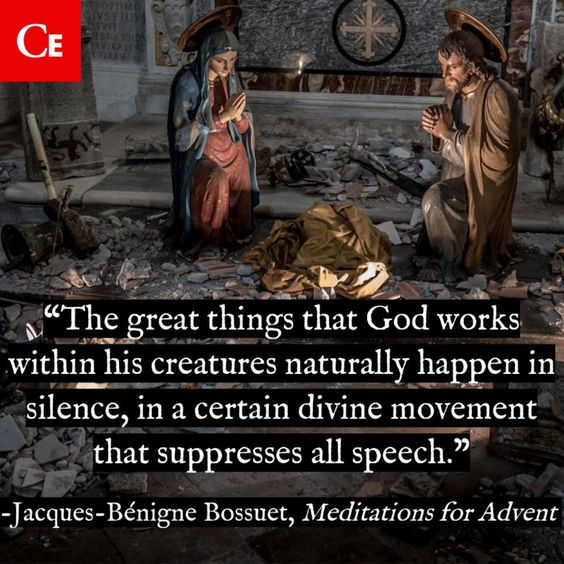We beheld the shepherds coming in from their fields glorifying God and bringing all who heard them to glorify him too. Yet here is something still more marvelous and edifying: “Mary kept all these things, pondering them in her heart.” And furthermore, “his father and his mother marveled at what was said about him” (Luke 2:19, 33).
Would it not be better to unite ourselves to Mary’s silence rather than to attempt to explain her merits with words? For what is more wonderful, after the annunciation and the birth, than to hear the whole world talking but nevertheless to remain silent? She had carried in her womb the Son of the Most High. She had seen him come forth like a ray of the sun from a cloud, pure and luminous. What must she have felt by his presence?
And if only for being near him, John leaped for joy in his mother’s womb, what peace and what divine joy were felt by the Blessed Virgin at the conception of the Word that the Holy Spirit formed in her? What, then, could she have said about her dear Son?

Nevertheless, she allows him to be praised by everyone; she listens to the shepherds; she speaks not a word to the Magi who come to adore her Son; she listens to Simeon and to Anna the prophetess; she speaks only to Saint Elizabeth, who had been made a prophet by her visit, while Mary herself appeared only to be astonished and ignorant. Joseph shared in her silence as he shared in her secret, he to whom the angel had spoken such great things and who had seen the miracle of the virgin birth. Neither of them spoke of what they saw every day in their house nor sought any advantage from so many miracles. As humble as she was wise, Mary allowed herself to be thought of as a simple mother and her Son as the offspring of an ordinary marriage.
The great things that God works within his creatures naturally happen in silence, in a certain divine movement that suppresses all speech. For what could we say, and what could Mary have said that could have equaled what she felt? Thus, God’s secret is kept under the seal unless he himself opens the lips and makes the words come forth. Human advantages are nothing if they remain unknown and if the world does not lay hold of them. Those God makes, however, have in themselves an inestimable worth that one wants to share with God alone.
Men, how vain you are, and how vain is the ostentation that moves you to make a display of your feeble accomplishments for the eyes of men just as vain as you! “O men, how long will you love vain words, and seek after lies?” (Ps. 4:2). All the goods that one vaunts are nothing in themselves: opinion alone gives them their value.
There are no true goods but the ones that can be tasted in silence with God. “Be still, and know that I am God” (Ps. 46:10). “O taste and see that the Lord is good” (Ps. 34:8). Love solitude and silence. Draw back from the noisy conversation of the world. Stay closed, O my mouth, and do not deafen my heart, for it is listening to God. Stop interrupting and troubling my sweet attentiveness. Vacate et videte, says the psalmist: “live in holy leisure and see.” And again: “Taste and see that the Lord is good.” Allow this celestial taste to speak in you.
Gustate et videte, quoniam suavis est Dominus (Taste and see that the Lord is good).
✠
This article is adapted from a meditation in Bishop Bossuet’s Meditations for Advent. It is available through Sophia Institute Press.
Image by Mauricio A. from Pixabay













